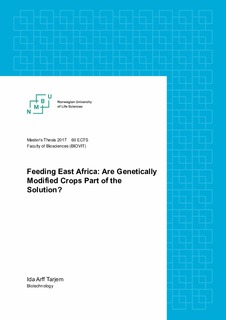| dc.description.abstract | The African continent is faced with enormous challenges of poverty, hunger and food insecurity, which is exacerbated by climatic and environmental change, and a rapidly increasing population; and in the midst of it all is the smallholder and subsistence African farmer.
Some believe that genetically modified organisms (GMOs) and GM crops may offer part of the solution to some of these challenges. The GMO debate has gained considerable traction in the East African region, as recent regulatory amendments have opened up the door for commercialisation of GM crop plants. One GM crop that could possibly hit the East African market in a few years’ time is banana resistant against the devastating bacterial disease, Banana Xanthomonas Wilt; a disease which is currently threatening the livelihoods of millions that rely on bananas and plantains (Musa spp.) for their staple food.
However, little is known about the potential impacts of GM crops on various components of the East African society and ultimately on the quality of life of the East African farmer.
The goal of this thesis was to investigate the potential role of GM crops in solving some of the current and future challenges in East Africa, including a real life example of GM bananas; how the technology may interact with several aspects of society, including human health, the environment, politics and socio-economics; and the level of awareness and perceptions that exists’ on the topic among a range of stakeholders, including farmers.
Overall, the majority of farmers and stakeholders with a professional background expressed relatively high levels of positive perceptions and acceptance of GM crops. The simulation model demonstrated that general attitude towards GMOs, occupational group, educational level and at times nationality had the most prominent effects on the perceptions of stakeholders with a professional involvement in agricultural biotechnology. In the case of farmers, the model demonstrated relatively few demographic effects, with the exception of educational level, sex, marital status and cultural leaning. However, there were significant differences in the level of awareness, attitudes and perceptions of GM crops on the basis of geographical location (i.e. within and between study countries). Such differences may be explained by factors such the level of public advocacy and impact of the GMO debate, prior knowledge of the underlying technology, risk/benefit perception, level of trust in various institutions and governments, culture and tradition, and differences in the socio-economic and socio-political environment.
The findings from the present study suggests that GM crops could represent a complementary solution alongside conventional practices and agro-ecological farming, as a way of meeting some of the challenges faced by the East African region. One such potential crop may be bananas resistant against Banana Xanthomonas Wilt. Still, the successful widespread adoption of GM crops may require a range of measures, including – but not limited to – awareness and educational efforts, and improved regulatory, scientific, technical, human and infrastructural capacity. | nb_NO |

